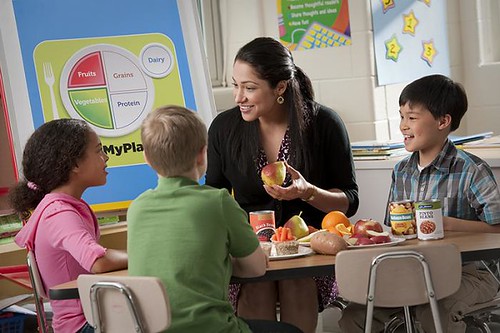
Each March, the Academy of Nutrition and Dietetics encourages Americans to return to the basics of healthful eating through National Nutrition Month. To kick off the month-long celebration of nutrition and health, we wanted to recognize the Academy, who initiated this observance in 1973 as a week-long event that eventually grew into the established month-long observance in 1980. Today we hear from the Academy’s President on the value of nutrition education, such as MyPlate, and its importance to federal nutrition programs.
By Dr. Evelyn F. Crayton, RDN, LDN, FAND, President of the Academy of Nutrition and Dietetics
Access to safe, affordable, nutritious foods is central to the missions of both the U.S. Department of Agriculture and the Academy of Nutrition and Dietetics – the world’s largest organization of food and nutrition professionals.
Access to nutritious food is just part of the solution: Building people’s motivation, knowledge, skills and abilities around food and nutrition makes a lifelong impact that reduces health care costs and improves hunger status.
As the 2015-2016 President of the Academy of Nutrition and Dietetics, I am proud to represent more than 76,000 nutrition professionals who are driven to understand and translate the latest food and nutrition science, such as the 2015-2020 Dietary Guidelines for Americans. Our goal is always to improve the health of Americans. I, like so many of my fellow Academy members, have devoted my career to work with people so they are empowered to feed themselves and their families well. During my time as Assistant Director of Extension Family and Consumer Sciences for the state of Alabama, my staff engaged child nutrition program staff, as well as children and parents, in lessons about food safety, nutrition, cooking and gardening. We worked directly with families enrolled in the SNAP Nutrition Education (SNAP-Ed) program to empower persons eligible for SNAP to make healthy choices within a limited budget, with minimal time, and in challenging food environments.
Nutrition assistance programs have historically included nutrition education, such as MyPlate, grounded in the best science from the most recent edition of the Dietary Guidelines for Americans, as a critical component of success. National programs, like the Special Supplemental Nutrition Program for Women, Infants, and Children (WIC) and the Expanded Food and Nutrition Education Program (EFNEP), have incorporated nutrition education since their inception, and other programs continue to add nutrition education as a critical component to improving the health and quality of life of the populations they serve.
These engaging and creative nutrition education programs continue to evolve to meet the demands of modern lifestyles. Nutrition education works hand in hand with nutrition assistance programs. Access to healthy foods and innovative education work together best to empower healthy families with knowledge.
Here are some examples:
WIC
WIC provides individual and group nutrition counseling and breastfeeding support to mothers, their babies and young children. This program is remarkably cost-effective and builds a strong nutrition foundation starting prenatally. Breastfeeding support is institutionalized in WIC, and WIC peer counselors are available outside usual clinic hours and outside the clinic environment. New technology is helping mom’s access nutrition education in their homes and workplaces via online modules and even Skype, not just in clinics.
SNAP-Ed and EFNEP
Promising research from Purdue University notes that four to ten nutrition education sessions through SNAP-Ed and EFNEP move families from food-insecure to food-secure. Nutrition education provides participants with tools to ensure that their families have adequate, healthful meals despite difficulties of limited money, time or access to good food.
School Nutrition
In Iowa, a team of registered dietitian nutritionists is working with schools through a USDA Team Nutrition Grant to help parents and caregivers learn how healthy eating and daily physical activity are linked to academic success. These professionals are highlighting the benefits of school meals on children's health and learning, particularly with the updated meal standards required under the Healthy, Hunger-Free Kids Act. Supporting parents to make healthy choices for their families at home helps reinforce the learning and access to healthy food afforded by school meals.
One of the tenets of the Farm to School Program is nutrition education. Team Nutrition’s Grow it, Try it, Like It curriculum promotes experiential learning about where food comes from and promotes trying a variety of fruits and vegetables. This kind of hands-on education is proven to get children excited about trying new foods and can be linked to what is being served in the school cafeteria.
MyPlate
MyPlate translates the Dietary Guidelines for Americans into actionable, easy to understand tips and resources for people to eat a healthy, balanced diet. ChooseMyPlate.gov houses all of the MyPlate materials for kids, families, adults, and professionals. Readers can find tips for eating healthy on a budget, interactive food and activity tools, fun games, recipes, and information in different languages. MyPlate provides healthy eating solutions for everyday life.
Our nation faces rising rates of obesity. One-third of the population is obese, and obesity is associated with chronic diseases like heart disease, type 2 diabetes, stroke, and certain cancers. Obesity and its related diseases cost amount to $147 billion annually, with an obese patient accumulating $1,429 more per year in medical costs than people of normal weight. Furthermore, more than 14 percent of the U.S. population deals with food insecurity.
Nutrition education, in conjunction with access to safe, affordable, nutritious food, is critical to help improve Americans’ quality of life and alleviate the financial burdens of these issues.
March is National Nutrition Month. Throughout the month, USDA will be highlighting results of our efforts to improve access to safe, healthy food for all Americans and supporting the health of our next generation.
